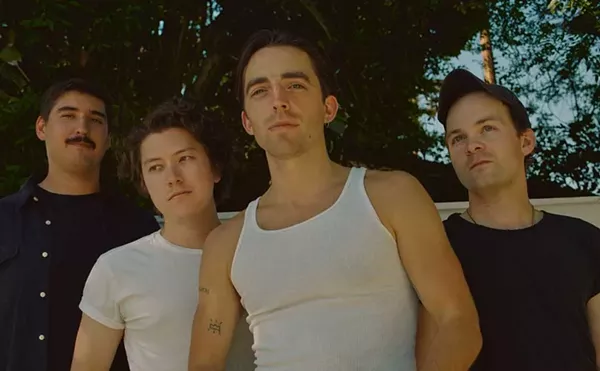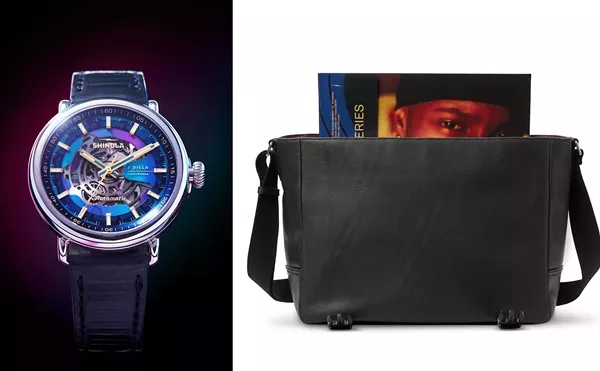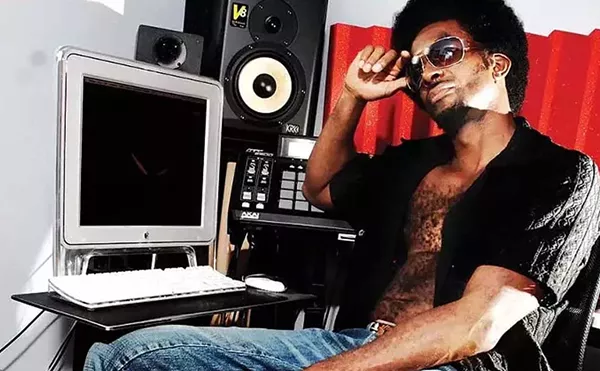
Audio By Carbonatix
[
{
"name": "GPT - Leaderboard - Inline - Content",
"component": "35519556",
"insertPoint": "5th",
"startingPoint": "3",
"requiredCountToDisplay": "3",
"maxInsertions": 100,
"adList": [
{
"adPreset": "LeaderboardInline"
}
]
}
]
Nicholas Payton refuses to be part of any music industry fads. And listening to the 30-year-old trumpeter-cum-bandleader talk about his musical evolution gives the impression that he has always been somewhat of an anomaly. He has a reputation for being the kind of musician who makes unorthodox choices, unfazed by the prospect of becoming an overnight sensation.
“I actually put off signing with a record label because I wanted to experience working with drummer Elvin Jones, trumpeters Doc Cheatham, and Clark Terry. I wanted really to take time to address the fundamentals of the music, to serve an apprenticeship with some of the masters. This was when record companies were going crazy over the ‘young lions’. I didn’t want to be a part of that whole thing,” explains Payton (who nonetheless was often lumped with the post-Wynton Marsalis “young lions” crowd.
Payton claims that his primary concern was always to develop as a player. The New Orleans native started performing professionally at age 8; hearing Miles Davis’ classic album Four and More at 11, he says, was all the impetus he needed to seriously pursue jazz. As a teenager he studied under pianist Ellis Marsalis and performed locally with the New Orleans Brass Band. By the time he hit 16, record companies were already trying to recruit him.
He turned them down.
Instead, Payton enrolled at the University of New Orleans, but quit after his first semester to tour with Elvin Jones. He played with Jones for two years, and it was while under the jazz luminary’s tutelage that Payton says that he became an accomplished player.
“A lot of times he would challenge me,” says Payton of the Pontiac-born Jones. “I would be so tired. We would be on the train for like 15 hours, then [at shows] I would play short solos, trying to conserve my chops. Elvin would get on my case about that … you either rose to the occasion or you where out of there. He used to say all the time that ‘people don’t care how tired you are or what you have been through all day. … They want to hear a good show.’”
But the stage wasn’t Payton’s only interest. He commenced his recording career with 1995’s From This Moment on Verve and then he went on to record such discs as Gumbo Nouveau, Payton’s Place, Nick@Night and Dear Louis; he shared an instrumental solo Grammy with Doc Cheatham in 1997 for their rendition of “Stardust” on Doc Cheatham & Nicholas Payton. All the while, Payton kept exploring new creative possibilities.
In 2002, Payton left Verve and joined Warner Bros., closing out what he considers to be the first chapter of his musical career. His latest album, Sonic Trance, is a radical departure from his previous acoustic offerings: This project has a more contemporary flavor. It’s an amalgamation of different sounds and instrumentation with a traditional jazz subtext. (Imagine trumpeter Louis Armstrong performing Miles’ Bitches Brew.)
“It’s been something that I have been working toward for a number of years,” he says. “It took for me to be in the right frame of mind, to have the right cats to be where I felt comfortable that I could pull this off. Sonic Trance is the first step in the direction of me trying to create and continue to represent the spirit of jazz, but with more contemporary influences, more of the music that I grew up listening to.”
Payton also wanted to expand his audience by attracting a younger generation of listeners.
“I wanted to do something that young people would gravitate toward. … I just wanted to expand and include more people into what I’m doing.”
Payton knew some critics would hate the album. And he admits that, initially, he had his trepidations. Fans could vibe with his other albums after the first listen, but Sonic Trance required more involvement. In the end, he stuck with his plan to create something different and it paid off with a Grammy nomination in 2003 for best contemporary jazz album.
“I was feeling dismal for awhile. I felt like no one was really listening or was really getting it, and to be recognized by my peers that really gave me a lot of affirmation.”
Payton doesn’t plan to return to making acoustic jazz records anytime soon.
“I just like the freedom and the latitude to be able to play whatever kind of music that I feel at the time. The instrumentation isn’t what gets old. You can have freedom in all forms of jazz; it’s the way that you play it. I want to always create something new. I want to be better than I am. I don’t want to be stagnate — regardless of whether I’m gigging or what people are saying about my music. I want to be able to keep moving forward — that what it’s all about.”
Nicholas Payton performs with his band Sonic Trance at Orchestra Hall (3711 Woodward Ave., Detroit) on Friday, May 21. Call 313-576-5111.
Charles L. Latimer writes about jazz for Metro Times. Send comments to letters@metrotimes.com




